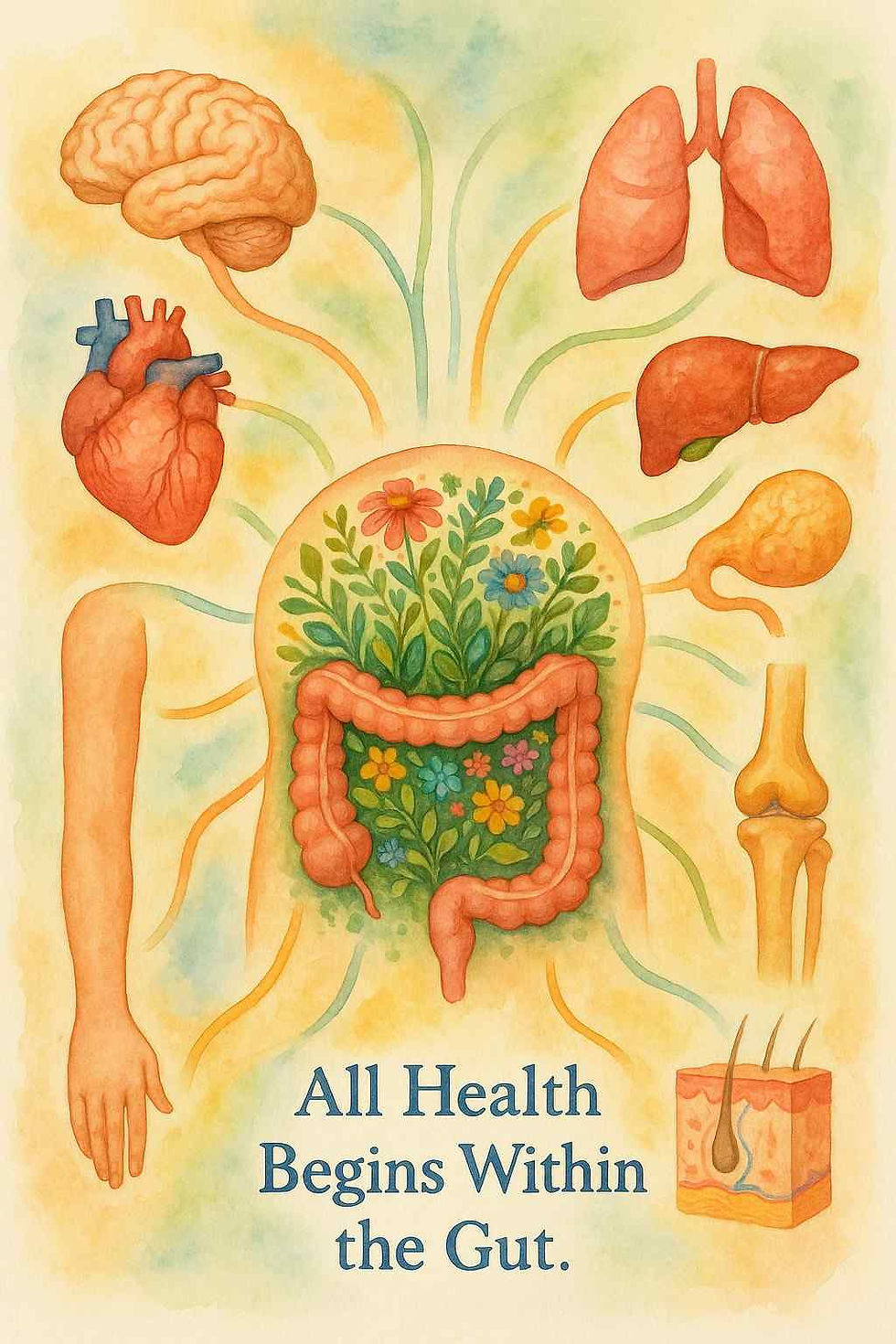LIFESTYLE DISEASES ARE JUST A SYMPTOM OF CHRONIC CONSTIPATION
- Madhukar Dama
- May 2, 2025
- 4 min read

Constipation: The Silent Root of Lifestyle Diseases
Your gut is not simply for digesting food—it is the heart of your entire body's health. Within your gut resides a bustling ecosystem of microbes working tirelessly to keep every part of your body functioning smoothly. When this gut ecosystem is disturbed (gut dysbiosis), the first major and often unnoticed outcome is chronic constipation. Constipation isn't just about fewer bowel movements; it's about impaired detoxification, increased inflammation, nutrient malabsorption, and systemic stress throughout your body.
Chronic constipation is not merely uncomfortable—it is the earliest, most reliable indicator of deeper disturbances in gut health, often leading to numerous other lifestyle-related diseases.
Exhaustive Roles of Your Gut (Why Constipation Matters Greatly)
Your gut influences virtually every aspect of your health, including:
Digestion and absorption of essential nutrients
Immune system strength and disease resistance
Mood, happiness, anxiety, and mental health
Brain clarity and cognitive function
Hormonal balance and reproductive health
Metabolism and healthy weight management
Skin clarity and anti-inflammatory protection
Energy levels and fatigue prevention
Sleep regulation and circadian rhythms
Bone health through mineral absorption
Heart, liver, kidney, and respiratory function
Joint flexibility and muscle health
Cancer prevention via immune modulation
Thus, chronic constipation severely impacts each of these vital roles, causing widespread disturbances in overall health.
Lifestyle Diseases Linked to Chronic Constipation
Below is a comprehensive list of lifestyle-related diseases scientifically reported, emerging, or strongly linked to chronic constipation, along with brief explanations:
Obesity: Constipation promotes inflammation, disrupting metabolism and increasing fat storage. (Link)
Type 2 Diabetes: Constipation interferes with insulin sensitivity and glucose metabolism. (Link)
Cardiovascular Disease: Constipation elevates inflammation, raising cholesterol and heart disease risk. (Link)
Hypertension: Constipation-induced inflammation contributes to persistent high blood pressure. (Link)
Fatty Liver Disease (NAFLD): Constipation enhances liver stress, inflammation, and fatty deposits. (Link)
Metabolic Syndrome: Chronic constipation promotes obesity, hormonal imbalance, and systemic inflammation. (Link)
IBD (Crohn’s, Ulcerative Colitis): Constipation aggravates intestinal inflammation and autoimmune reactions. (Link)
IBS (Irritable Bowel Syndrome): Constipation exacerbates gut hypersensitivity and irregular bowel patterns. (Link)
Autoimmune Arthritis (Rheumatoid): Constipation triggers joint inflammation and autoimmune flare-ups. (Link)
Psoriasis: Constipation-linked inflammation worsens autoimmune skin conditions. (Link)
Multiple Sclerosis: Chronic constipation intensifies autoimmune responses, accelerating nerve inflammation. (Link)
Lupus (SLE): Constipation enhances autoimmune inflammatory reactions. (Link)
Asthma: Constipation-related inflammation heightens respiratory allergic reactions. (Link)
Depression & Anxiety: Constipation impairs neurotransmitter balance, influencing mood disorders. (Link)
Autism Spectrum Disorder: Constipation disrupts gut-brain signals, impacting behavior and development. (Link)
Parkinson’s Disease: Constipation precedes neurological degeneration and neuroinflammation. (Link)
Alzheimer’s Disease: Constipation accelerates cognitive decline via inflammation and toxicity. (Link)
Epilepsy: Constipation alters neurotransmitter function, contributing to seizure susceptibility. (Link)
Fibromyalgia: Constipation-induced inflammation intensifies chronic pain sensitivity. (Link)
Cancer (Colorectal, Breast, Liver): Constipation promotes prolonged toxin exposure, increasing cancer risks. (Link)
Conclusion: Lifestyle Diseases Are Symptoms of Chronic Constipation
What we commonly call lifestyle diseases are essentially downstream symptoms of chronic constipation, the primary indicator of gut imbalance. Constipation isn't just discomfort—it's your body's earliest distress signal that the gut’s internal environment is severely compromised.
Extensive scientific research has shown that correcting chronic constipation by naturally restoring healthy gut function leads directly to the reversal of multiple lifestyle diseases. Projects worldwide demonstrate that addressing constipation through dietary fiber, probiotics, fermented foods, proper hydration, fasting, and avoiding inflammatory foods effectively reverses obesity, diabetes, hypertension, autoimmune disorders, depression, anxiety, and even cognitive diseases (Research Example).
Healing chronic constipation, therefore, becomes the cornerstone of reclaiming vibrant health and eliminating lifestyle diseases at their root. When you restore regular bowel movements naturally, you restore systemic health—because your gut truly is everything.
---
GENERAL GUT MICROBIOME FUNCTIONS & IMPORTANCE
1. Human Microbiome Project Consortium. (2012). Structure, function and diversity of the healthy human microbiome. Nature.
2. Belkaid, Y., & Hand, T. (2014). Role of the microbiota in immunity and inflammation. Cell.
3. Mayer, E.A., et al. (2015). Gut/brain axis and the microbiota. Journal of Clinical Investigation.
---
SPECIFIC LIFESTYLE DISEASES & GUT DYSBIOSIS
4. Obesity:
Turnbaugh, P.J. et al. (2006). An obesity-associated gut microbiome with increased capacity for energy harvest. Nature.
5. Type 2 Diabetes:
Qin, J. et al. (2012). A metagenome-wide association study of gut microbiota in type 2 diabetes. Nature.
6. Cardiovascular Disease:
Wang, Z. et al. (2011). Gut flora metabolism of phosphatidylcholine promotes cardiovascular disease. Nature.
7. Hypertension:
Yang, T. et al. (2015). Gut dysbiosis is linked to hypertension. Current Hypertension Reports.
8. Non-Alcoholic Fatty Liver Disease (NAFLD):
Le Roy, T. et al. (2013). Intestinal microbiota determines development of NAFLD. Gut.
9. Autoimmune Disorders:
Manfredo Vieira, S. et al. (2018). Translocation of gut pathobionts drives autoimmunity in lupus. Nature.
10. IBS (Irritable Bowel Syndrome):
Jeffery, I.B. et al. (2012). An IBS subset shows microbiome imbalance. Gut.
11. Depression & Anxiety:
Kelly, J.R. et al. (2016). Breaking down the barriers: the gut microbiome, intestinal permeability and stress-related psychiatric disorders. Frontiers in Cellular Neuroscience.
12. Autism Spectrum Disorder:
Kang, D.W. et al. (2017). Microbiota Transfer Therapy alters gut ecosystem and improves autism symptoms. Microbiome.
13. Parkinson’s Disease:
Sampson, T.R. et al. (2016). Gut microbiota regulate motor deficits and neuroinflammation in a Parkinson’s model. Cell.
14. Alzheimer’s Disease:
Vogt, N.M. et al. (2017). Gut microbiome alterations in Alzheimer’s disease. Scientific Reports.
15. PCOS (Polycystic Ovary Syndrome):
Lindheim, L. et al. (2017). Alterations in gut microbiome composition and barrier function are linked to PCOS. PLoS ONE.
16. Eczema & Skin Disorders:
Salem, I. et al. (2018). The gut microbiome and inflammatory skin diseases. Frontiers in Microbiology.
17. Cancer (Colorectal):
Garrett, W.S. (2015). Cancer and the microbiota. Science.
18. Reversal of Diseases via Gut Microbiota Repair:
Smits, L.P. et al. (2013). Therapeutic potential of fecal microbiota transplantation. Gastroenterology.
---



